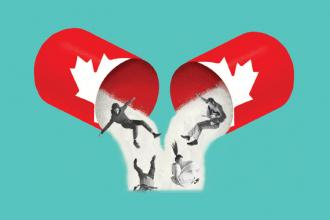Becoming Canadian
Mr Chrétien announced his retirement, so I applied to become a Canadian citizen.
Canada Customs and Immigration sent an eight-page application form that focused on the peripheral details beloved of governments everywhere. Photographs were taken, documents were photocopied, criminal records were expunged, and the completed application form was duly submitted.
To the alarm of some and the surprise of all, the application was taken seriously. I received a 32-page guide to taking the citizenship test. It’s been a long time since I took any kind of test with an important and binding outcome, so I enlisted a coach. The last six pages of the guide consisted of sample questions about Canada, offered as a warm-up for the citizenship test itself. Some of it I already knew, but much of it was new and surprising information. Eventually I decided that I would answer any surprise question with either “1867” or “the fur trade,” since those seemed to be the most popular answers.
The citizenship test, written at a specified time in the new CC&I offices next to BC Place Stadium, comprised 30 multiple-choice questions. Two of these, we were warned ominously, were critical to passing the test. We candidates were shown into separate rooms to write the test. My room rather portentously contained a table, an empty Pepsi can, and no chair. I asked for and was given a pencil to write my answers; I was disappointed that the pencil was manufactured in the US, and, moreover, I was not allowed to keep it as a souvenir.
I passed the test and received official notification to attend the swearing-in ceremony. By this time my co-workers were taking a curious (and, I thought, sardonic) interest in the process, and my possessions were often festooned with Maple Leaf flags, stickers, and other Canadiana. I wondered if this was a tradition. My wife was also in on the act, and we duly attended the swearing-in as directed. We repeated the oath of allegiance (in both official languages, eh?), sang “O Canada” just slightly off-key, received our certificates and cards, and went back to work.
Did our lives change? Not really. Do we feel better for having done this? Undoubtedly. For all my long-standing cynicism, I acknowledge that Canada is a wonderful country, a great country. The system in which I work has its deficiencies and its critics, but so does every country’s medical system. Speaking now as a Canadian citizen rather than as a physician, I have to say that Canada’s medical system supports its entire population as few others do—if any. Although adjustments to the system are inevitable, the strength of the current system is derived from its sincere attempt to balance the needs of the entire population with those who provide services. I admire that sincerity.
I suspect that these warm and fuzzy feelings won’t last, but I hope they do.
—TCR

